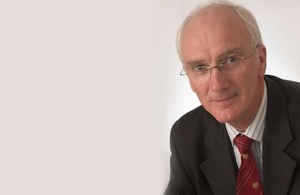Chair for the Committee on Radioactive Waste Management standing down
Professor Laurence Williams has stood down as Chair of CoRWM.

Professor Laurence Williams
Professor Laurence Williams FREng FIMechE FNucI stood down as Chair of the Committee on Radioactive Waste Management (CoRWM) at the end of October 2017. He has held the post since November 2012.
Professor Williams has had a long and distinguished career in the field of nuclear regulation, fulfilling the role of the government’s Chief Inspector of Nuclear Installations from 1998 to 2005, and is currently Chair of the Defence and Nuclear Safety Committee. He is a senior research fellow at Imperial College London, and was formerly Professor of Nuclear Safety at the University of Central Lancashire.
Professor Williams said:
The effective management of the UK’s radioactive waste is essential not only to deal with past legacies but also for the successful exploitation of nuclear energy in the future. CoRWM has made, and will continue to make an important contribution to the management of radioactive waste.
The past 5 years have been both challenging and rewarding knowing that I have been able to contribute to this essential task. It has been both an honour and privilege to have chaired a committee of such distinguished and talented people.
I have every confidence that the current members of CoRWM will continue to provide invaluable advice to ensure that the new Geological Disposal Facility (GDF) siting process will be a success.
Energy Minister Richard Harrington said:
On behalf of BEIS and the devolved administrations, I would like to thank Professor Williams for his outstanding commitment, dedication and professionalism serving as Chair of the Committee on Radioactive Waste Management (CoRWM) for the last 5 years.
CoRWM performs a vital function in providing scrutiny and advice on government radioactive waste management programmes. This has included constructive feedback and challenge in various fora such as the Geological Disposal Programme Board, as well as an invaluable level of independent assurance.
You have made an enormous contribution to the committee over the years and we particularly wish to thank you for your commitment to the timely and effective delivery of successive work programmes and CoRWM annual reports; your contribution to the implementation strategy for Scotland’s policy on higher activity radioactive waste; and your assistance in the development of the Welsh government’s radioactive waste policy.
The Department for Business, Energy and Industrial Strategy has launched a recruitment campaign to find a new Chair for CoRWM, expected to complete by April 2018. Further details can be found on the public appointments website.
CoRWM’s Deputy Chair Professor Campbell Gemmell is standing in as interim Chair of the Committee until a new Chair is appointed.
Notes for editors
-
The Committee on Radioactive Waste Management provides independent scrutiny and advice to UK government and devolved administration ministers on long-term management of radioactive waste, including storage and disposal. The Committee’s primary task is to provide independent scrutiny of the UK government’s and Nuclear Decommissioning Authority’s proposals, plans and programmes to deliver geological disposal, together with robust interim storage, as the long-term management option for higher activity waste. For more information see the CoRWM website.
-
The role of CoRWM Chair is remunerated at a rate of £450 per day; it is expected that the Chair will spend about 1.5 days per week on CoRWM business.
-
The appointment is made by the Parliamentary Under Secretary of State, Minister for Energy and Industry, on behalf of the Devolved Administrations as joint sponsors of CoRWM.
-
Appointments to CoRWM are made in accordance with the Code of Practice of the Commissioner for Public Appointments. All appointments are made on merit and political activity plays no part in the selection process. However, in accordance with the Nolan recommendations, appointees’ political activity (if any declared) must be made public.